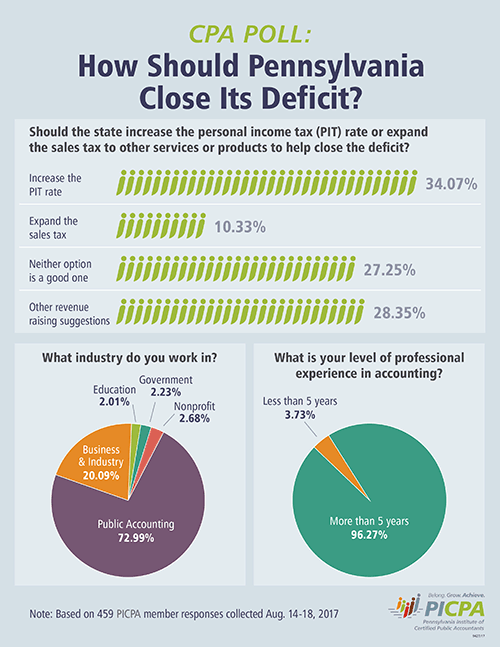Subscribe for Weekly Updates

Pennsylvania CPAs Split on Ways to Close State’s Deficit
 By Jim DeLuccia, PICPA communications manager
By Jim DeLuccia, PICPA communications manager
Pennsylvania has a nearly $3 billion structural deficit, and it continues to grow. In August 2017, Pennsylvania CPAs completed a brief PICPA survey on how they think the state should help close this deficit. Respondents were asked if Pennsylvania should increase the personal income tax (PIT) rate, expand the sales tax to other services or products, or offer another suggestion. The results were tight (as seen in the chart below), which highlights the complexity of the issue the state is facing.

Just a tick over one-third of respondents felt an increase to the PIT was the best answer, a measure only reluctantly discussed in the capitol halls. An increase to the PIT, many believe, would be the simplest way to close the deficit because of the revenue it could generate (for example, a 0.10 percent increase raises over $325 million). It would also eliminate the need to borrow or raise other taxes. But more than half of respondents felt that neither raising the PIT nor expanding the sales tax was a good option, and that other measures should be taken.
A variety of different tax options and curtailing of state pensions were the most popular “other” answers provided. Pennsylvania’s state pension funding crisis is a hot topic among members. Some progress was made in this area with the passage of Act 5 of 2017, but many members feel the recently passed reform did not go far enough. The PICPA acknowledges the imperfections of the bill, but sees its passage as one step in the right direction. The PICPA’s Fiscal Responsibility Task Force has proposed other solutions to help fix this problem in its latest issues brief. Jason Skrinak, CPA, a member of this task force, outlined some other deficit-closing options in an appearance on ABC-27 in Harrisburg.
Several respondents called on the state to forgo any additional taxes, and instead felt the legislature should decrease or better control spending. Placing third among the “other” respondents were suggestions that the state should tax retirement income or impose a tax on natural gas production.
The “expand the sales tax” option garnered just 10 percent of votes, which is unsurprising as this measure could adversely affect CPAs conducting business in Pennsylvania. Even though a recent letter ruling helped to clarify what taxable support work is in Pennsylvania, the state could rule that some consulting services previously deemed as exempt may indeed be subject to tax.
The PICPA also asked members what, if any, advice they are providing clients regarding Pennsylvania’s deficit. The majority of respondents are not providing any advice at this time because so few of their clients are concerned about the issue. Several members, however, said they advise their clients to be prepared for a tax increase. Others inform their clients to cut spending and balance their budgets, while some suggest that clients contact their legislators to persuade them to take a different approach to solve the deficit issue.
While Pennsylvania CPAs are divided on how best to solve the state’s structural deficit, most of the respondents were united on one cause: the state needs to become more fiscally accountable for its decisions. The PICPA’s government relations team actively listens to your concerns. The PICPA and its members work tirelessly to promote sound tax and fiscal policies to legislators on behalf of the state’s business owners, consumers, and CPAs. If you would like to get more involved and make a difference, subscribe to PICPA’s Legislative Update to keep current on all the latest news and consider contributing to the CPA-PAC.
Note: The survey was based on 459 PICPA member responses collected Aug. 14-18, 2017.







Leave a commentOrder by
Newest on top Oldest on top